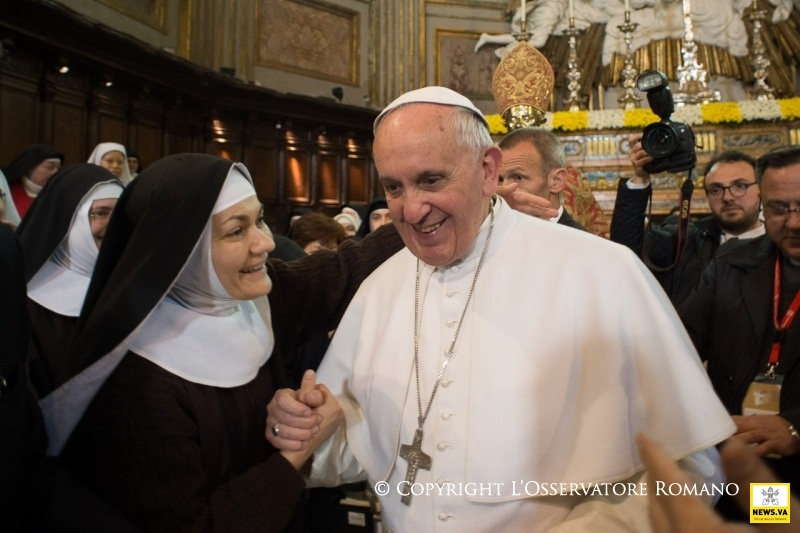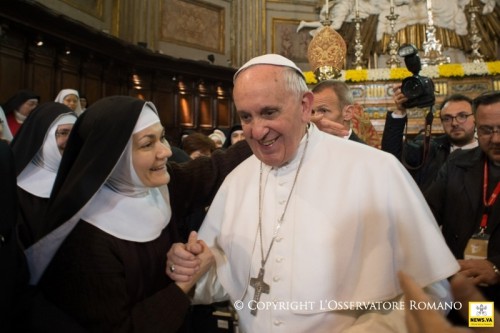13th April 2015
Nuns, the Church and Society

Stereotypical images tend to come to mind, at least the non-Catholic British mind, when we think of nuns. We think of Julie Andrews and The Sound of Music. Perhaps Sister Wendy Beckett delivering art lectures. We might just stretch to Mother Teresa in the slums of Calcutta.
Like most stereotypes, such images are both unhelpful and out-dated. The OED definition of the word is “Woman living in a convent usually under vows of poverty, chastity and obedience”. It also, usefully, reminds us that it derives from the Latin word “nonna”, the feminine version of “nonnus” meaning monk, but also the same as the modern Italian word for grandmother. And like modern grandmothers, nuns may be found in a wide range of roles, places and occupations.
A look in the Holy See’s directory reveals hundreds of different female religious orders. All are dedicated to God and to service. But what variety that encompasses! I recently spent a few days in Venice, where I stayed with my family in a House run by the Sisters of Missionary Servants of the Holy Sacrament. While their numbers are diminishing in Europe, they are flourishing in the Philippines, and actively living their vocation of spreading the Gospel amongst lay people and families. Their hospitality to us and other visiting groups was exceptionally kind. Professionally, my embassy has worked closely with members of the Women Superiors of Italy in their work to tackle human trafficking, bringing together their incomparable networks to support victims trafficked to places like the UK, and reunite them with their families from Albania to Nigeria. And just last month, I met a number of members of the Council of the International Union of Superiors General – including Benedictines, members of the Missionaries of Our Lady of Africa, and Loreto Sisters – to discuss sexual violence against women in conflict. We examined how their networks, especially in Africa, might link with those of the UK and other countries in helping to end the culture of impunity against sexual violence perpetrators, and better protect women and men from the crime.
Round the table at such gatherings have been psychologists, surgeons, social workers, professors, administrators, management consultants, health workers, accountants and computer experts. As it happens, all have been nuns. All dedicated to poverty, chastity and obedience. And all making a difference to the lives of others in our very contemporary world.
So when you next think of nuns, by all means remember Mother Teresa, but also think, perhaps, of the African sister who suggested to me how her Congregation might set up a smart phone app to provide advice to first responders in conflict zones where sexual crimes may have been submitted. Or the Scottish sister in Rome who is running management and leadership courses for men and women in the Church. Or even Mary Ward (1585-1645), Yorkshire born and bred, who resisted the glass ceilings and discrimination of her time to found an active ministry outside convent walls, and was placed on the first rung towards sainthood by Benedict XVI. That’s the reality. Not a guitar in sight.

It never fails to surprise me how the popes preach against power and yet are unwilling to share their own power with others when legitimate opportunities and even duties of sharing power are available…with women for instance (see previous comment).
What did surprise me was the homily of Francis today in casa Santa Martha, http://www.news.va/en/news/pope-avoid-the-temptation-of-transforming-faith-in). Coming from a pontiff who is said to be as humble as his namesake, one cannot help but wonder if he reflected upon his own powers which exceed by far the powers of any prime-minister and president, certainly those of Angela Merkel over her people. His powers are those of an absolute monarch.
Sharing headship of the Church (magisterium and governance) with women (i.e.: the ministry of Mary Magdalene on par with and not subordinate to Peter as per the Scriptures) would certainly restrict any temptations he has to power.
Today, more than a hundred years after women’s struggles for basic political rights in the secular world begun, Angela Merkel is the most influential person in the political world. She is there because she had a choice grounded on laws that recognize her dignity as a woman on par with men. She could have remained a simple housewife, become a doctor or a business manager, an artist or a theologian or even a psychologist, and any of those choices would have been wonderful. But she had a choice that in the past was reserved to men: the possibility of governing her country.
Unfortunately, there is no possibility of any Angela Merkel’s in the Catholic Church. Women are denied the possibility of supreme government in the Church simply because they are women.
It is thus that women are also denied the possibility of publicly manifesting their image and likeness to an intelligent and sovereign God.
Simply because they are women.
Nuns are wonderful and like secular doctors, artists or psychologists, the work they do is wonderful as well. But they are essentially and necessarily subordinate to men. Moreover, like firemen, their work is to put out the fires –caused largely by the very facts of inequality and the injustice that stems from inequality-.
A ministry of women in the Church on par with and not essentially and necessarily subordinate to men would make a tremendous preventive contribution. It’s a question of image. And God’s will.
Feminist theologians have been insisting on this for years. But the narrow minded who seem to dominate the Church close the door on women as women. And on the Holy Spirit.
Do we have to wait another hundred years, or must the struggle reach the streets while more and more women abandon a Church they have difficulty identifying with before the narrow minded stop putting up obstacles for women to be recognized as equals in the Catholic Church?
I pray and believe God will enable you sisters of Africa in installing the smart phone app for first response in conflicts.That a good idea